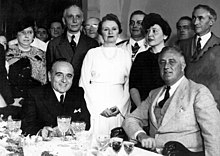Good Neighbor Policy
The Good Neighbor Policy ( German policy of good neighborliness ) was under Franklin D. Roosevelt one to about 1937/1938 powered form of US foreign policy towards the Latin American countries, which was characterized by respect for these states and a waiver of local military intervention.
The influence in Latin America should be preserved by other methods. The US commitment to Pan Americanism , support for certain Latin American regimes and increased cultural and economic contact should be seen in this context . The US government also aimed to support the South American governments, which were also affected by the Great Depression that broke out in 1929 .
background
Ever since the Monroe Doctrine was promulgated in 1823, the USA reserved the right to prevent any attempt by European states to exert influence in Latin America. "America for the Americans" was the doctrine of American foreign policy . In the decades that followed, the Monroe Doctrine received constant expansion. Latin America increasingly developed into the backyard of the United States, in which the latter intervened militarily (including through a gunboat policy ) if they saw their political or economic interests threatened . Finally, this extension of the Monroe Doctrine was promulgated in the Roosevelt Corollary in 1904 . The US claimed police violence in the western hemisphere.
After the United States entered World War I and subsequently withdrew into isolationism , nothing about this doctrine changed. On the contrary, the first two Republican presidents after the First World War, Harding and Coolidge , had little interest in foreign policy. Foreign policy towards Latin America only took on new features through President Herbert Hoover . In his inaugural speech in March 1929, he proclaimed a policy of non-intervention in Latin America. For example, during his presidency, US Marines left Nicaragua and their withdrawal from Haiti was announced. In addition, the US State Department successfully mediated between Peru and Chile and between Peru and Colombia .
Proclamation of the Good Neighbor Policy
In his inaugural address on March 4, 1933, Franklin D. Roosevelt proclaimed the Good Neighbor Policy. The armed forces were withdrawn from Haiti , the Montevideo Convention was signed at the 7th International Conference of American States , and the Platt Amendment , which granted the United States the right to intervene in Cuba as a supplement to the American-Cuban treaty of 1903 , was abandoned. In 1936 Roosevelt was the first President of the USA to take part in an intra-American summit, and in 1938 Mexico was granted the right to explore oil in its own country.
In addition, in view of the Japanese expansion in East Asia and the emerging German expansionism, a ring of loyal states should be created around the USA. Hitler's system was followed in the White House earlier than the American public . After the Second World War , the Good Neighbor Policy was gradually eroded in favor of increased economic influence.
See also
literature
- Stephan G. Bierling: History of American Foreign Policy. From 1918 to the present. CH Beck, Munich 2003, ISBN 3-406-49428-5 , pp. 79f.
- Dieter Kronzucker , Klaus Emmerich : The American Century. ECON Verlag, Düsseldorf / Vienna / New York NY 1989, ISBN 3-430-15701-3 , pp. 169f.
Web links
- Information on the good neighbor policy (English)
